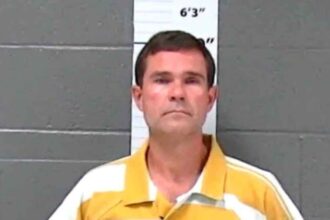- Jury convicts Daniel Hadders of first-degree murder in the death of scientist Christopher Fallen.
- Victim was found suffocated with a belt and plastic bag inside his Albuquerque home.
- Evidence linked Hadders to stolen property and Fallen’s car.
- Co-defendant Andres Chavez died from a drug overdose before trial.
- Prosecutors call it a “calculated and horrific act of violence.”
A New Mexico man who murdered a scientist that had taken him in out of kindness has been found guilty of first-degree murder.
Daniel Hadders, 38, was convicted Tuesday in the asphyxiation death of 46-year-old Christopher Fallen, a respected research scientist and chief scientist at Fourth State Communications in Cheyenne, Wyoming. Fallen was discovered dead in his Albuquerque home on February 6, 2024, a scene investigators described as one of shocking brutality.
Bernalillo County District Attorney Sam Bregman said Fallen’s body was found with his head “wrapped in tape” and “a belt was secured around his neck.” Investigators determined he was suffocated with a plastic bag and the belt, evidence of deliberate and calculated violence.
Authorities say Hadders met Fallen through Andres Chavez, a man who had a close relationship with the scientist. Chavez had met Fallen on a dating app and was allowed to stay in his home temporarily “to get on his feet and look for a job.”
That gesture of generosity ultimately led to tragedy. Between February 2 and February 5, 2024, Chavez exchanged a series of texts, calls, and social media messages with Hadders, including a chilling photo that police later uncovered.
In the photo, Fallen was “sitting on his bed with his hands bound together by a piece of clothing,” his eyes covered and his face bloodied. Detectives believe the image was taken on February 3, days before Fallen was found dead.
Fallen’s colleagues grew concerned after he missed several work meetings, prompting them to visit his Albuquerque home on February 6. When they couldn’t reach him, they broke in only to find a horrifying scene.
The scientist was bound with duct tape, his head wrapped, and a plastic bag and belt secured around his neck.
Police soon realized the home had been ransacked. Fallen’s car and several electronic devices were missing. Detectives later discovered paperwork bearing Hadders’s name inside the residence an early clue that helped track down the killer.
That same day, officers located Fallen’s stolen vehicle parked outside a Starbucks. Inside were Hadders and another person. Authorities detained both suspects and recovered key pieces of evidence, including Fallen’s credit cards, email information, keys, and documentation linking both Hadders and Chavez to the crime.
When questioned, Hadders admitted knowing Chavez but denied involvement in the killing, claiming he had purchased the car. However, according to a criminal complaint obtained by the Albuquerque Journal, Hadders and Chavez were homeless friends whom Fallen had taken in from the streets.
While Hadders faced trial, Chavez fled to El Paso, Texas, where he was later found dead from a drug overdose, ending his involvement before he could be tried. Prosecutors still charged Hadders with a lengthy list of crimes, including murder, conspiracy to commit murder, kidnapping, aggravated burglary, tampering with evidence, and fraudulent use of a credit card.
After a detailed trial featuring forensic evidence, digital communications, and expert testimony, the jury returned a guilty verdict on Tuesday.
District Attorney Bregman said, “This was a calculated and horrific act of violence, and thanks to the tireless work of our prosecutors and investigators, the jury held the defendant accountable.”
The conviction closes one of Albuquerque’s most disturbing criminal cases of 2024, one that underscores the dangers of misplaced trust and the devastating consequences of exploitation.









